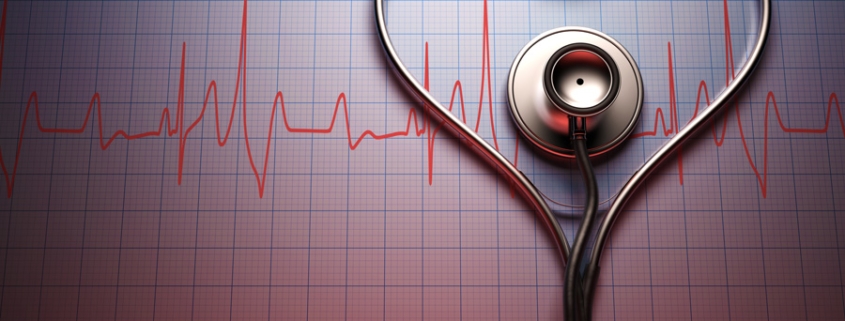
Cardiology in the heart of Frankfurt – Overview
Due to its complexity, the cardiovascular system cannot be adequately described in a few words.
In summary: In principle, it is a closed system that starts from the heart and leads back to the heart – hence circulation. The system includes both pulmonary circulation (heart to lungs and back) and systemic circulation (heart to body and back).
The heart works as a pump by building up the necessary pressure (blood pressure) to send the blood with the vital substances it contains (oxygen, nutrients, etc.) via the vessels (arteries and veins) on its journey to the organs. The heart consists of four chambers – two atria and two ventricles – that work in coordination to maintain appropriate pressure throughout the circulatory system.
Pathological changes in the heart and/or blood vessels can cause a variety of symptoms (e.g. shortness of breath, chest pain, dizziness, palpitations, etc.). Additional common symptoms include fatigue, edema (swelling of extremities), and syncope (fainting).
What are the characteristics of cardiology?
Cardiology is a science and medical specialty that deals with the cardiovascular spectrum of diseases and their therapy. Modern cardiology encompasses prevention, diagnosis, treatment, and rehabilitation of cardiovascular conditions across subspecialties including interventional cardiology, electrophysiology, heart failure, and preventive cardiology.
When should patients consult a cardiologist?
The cardiologist is your contact person for symptoms such as recurrent palpitations (irregular heartbeat), chest pain, shortness of breath, dizziness and much more. Patients with cardiovascular risk factors (hypertension, diabetes, family history, high cholesterol) should consider preventive cardiology consultations even without symptoms.
What is available to us diagnostically in the cardiological practice?
We have invested in the most modern cardiological function and ultrasound diagnostics (non-invasive) currently (2025). In medicine, the term non-invasive refers to diagnostic or therapeutic imaging that does not damage the integrity of the body.
The following non-invasive examination methods with the most modern, computer-assisted technology are available to us for heart and circulatory studies.
Resting ECG
12-lead electrical recording of the heart’s activity at rest to detect arrhythmias, conduction abnormalities, and evidence of ischemia or infarction.
Exercise ECG (ergometry)
Evaluates cardiac function during physical stress to reveal issues not apparent at rest, including exercise-induced arrhythmias and ischemia.
Long-term ECG (24 hours up to 7 days)
Now available: patch monitors for 14-30 day recordings and implantable loop recorders for patients requiring longer-term monitoring.
Long-term blood pressure (24 hours up to 7 days)
Provides comprehensive data including nighttime readings to identify masked hypertension or white coat hypertension not detected in office measurements.
HRV measurement
(stress regulation: heart rate variability, regulation of sympathetic and parasympathetic nervous system. Reduced HRV is associated with increased cardiovascular risk and helps identify autonomic dysfunction.)
State-of-the-art 3D/4D echocardiography (including Dynamic Heart Model)
Dynamic Stress Echocardiography
Visualizes cardiac function under stress conditions to detect coronary artery disease or valvular disorders that may not be apparent at rest.
Ultrasound examination of neck vessels and the abdominal aorta
Assesses atherosclerotic burden beyond the heart and can detect aneurysms or stenoses that require monitoring or intervention.
For the safety of our patients. For fast, conclusive diagnoses. These advanced diagnostics allow for rapid, accurate assessment of cardiovascular conditions, enabling prompt treatment decisions and improved patient outcomes.
What happens after an initial diagnosis?
Many diagnoses lead to conservative treatment. Examples:
- Therapy of cardiovascular risk factors (e.g. high blood pressure therapy, diabetes, blood lipid reduction, weight reduction). New therapies include SGLT2 inhibitors and GLP-1 receptor agonists with proven cardiovascular benefits, and PCSK9 inhibitors for refractory hyperlipidemia.
- Drug therapy of heart failure (cardiac insufficiency). Modern heart failure therapy now includes four cornerstone medications: ARNI (sacubitril/valsartan), beta-blockers, MRAs, and SGLT2 inhibitors, significantly improving survival rates.
- Drug monitoring of the heart rate (e.g. atrial fibrillation) and blood thinning if necessary. Current guidelines prefer DOACs (direct oral anticoagulants) over warfarin for most patients with atrial fibrillation due to reduced bleeding risk and no need for regular blood tests.
- There are also conservative treatment options for non-specific heart complaints that do not require drug treatment. These include structured cardiac rehabilitation programs, medically supervised exercise training, stress management techniques, and nutritional counseling.
- If further diagnosis or therapy is indicated, we refer our patients directly to heart centres associated with us. Our established referral network ensures patients can typically be seen within 1-2 weeks for non-urgent cases and within 24-48 hours for urgent conditions.
- These centres have the full range of complex non-invasive (including, for example, cardiac CT/MRI) and invasive diagnostics and therapy (such as coronary artery disease interventions in the cardiac catheter laboratory or electrophysiological procedures).
- Advanced interventions now include transcatheter valve replacements (TAVR), MitraClip for mitral regurgitation, left atrial appendage closure for stroke prevention, and catheter ablation for complex arrhythmias.
Preventive Cardiology and Specialized Programs
Our practice offers comprehensive cardiovascular risk assessment, sports cardiology evaluations, and post-COVID cardiac care.

Arshak Asefi, MD, Consultant Cardiologist Frankfurt am Main
